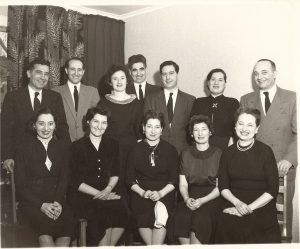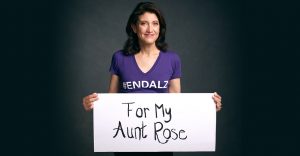“The Longest Day 2017 was truly one of the most memorable days of my life.”
Actress Amy Aquino, currently starring as Lt. Grace Billets on the Amazon series “Bosch,” is known for equally tough-as-nails characters she has brought to life on “ER,” “Being Human” and “Felicity.” She recently spoke with us about her deep familial connection to Alzheimer’s disease and how the color purple has inspired her participation in the Alzheimer’s Association’s fundraising event, The Longest Day, which encourages participants to select an activity they love — or an activity loved by those affected — to help end Alzheimer’s.
Amy, tell us about how Alzheimer’s disease has affected you and your family.
 Six of the 12 Aquino siblings developed Alzheimer's or dementia. This disease has been a part of my life since my teens. My father had 11 siblings; half of those brothers and sisters developed Alzheimer’s or another dementia, including early-onset Alzheimer’s. The first relative I saw affected was my Aunt Rose.
Six of the 12 Aquino siblings developed Alzheimer's or dementia. This disease has been a part of my life since my teens. My father had 11 siblings; half of those brothers and sisters developed Alzheimer’s or another dementia, including early-onset Alzheimer’s. The first relative I saw affected was my Aunt Rose.
Rose started showing signs of the disease in her late 50s, but neither she nor her doctors could identify what was happening; this was the early 1970s, and there was very little awareness of the disease. She lived in Philadelphia and my dad and another sibling living in the suburbs started getting emergency calls that she was wandering around the city. The whole family was traumatized, trying to figure out what was wrong with her and experimenting with various “cures”, until it was finally determined that Rose – like her father before her – had Alzheimer’s disease.
About 10 years later, one of my dad’s brothers was also diagnosed. Like Aunt Rose, Uncle Mike was brilliant, curious, vibrant and involved – all of Dad’s siblings were. Rose, my inspiration in gardening, lost her ability to garden, and Mike, an engineer, also lost his greatness to the disease.
Four siblings followed. Aunt Florence was fiercely independent throughout her life, building a long career in New York as an actress and playwright. Though she lived alone and had no children, she lavished attention on her nieces and nephews, and mentored hundreds of at-risk kids. Despite her having seen Rose through the disease, when she herself was hit with it she didn’t recognize it. Seeing her lose her independence – and how furious she was about being moved into memory care – was so hard to watch. As I watched her and the others grapple with dementia – including my own dad, near the end of his life— I realized that I almost couldn’t recall a time when I wasn’t witnessing some form of this disease. That is why I am trying to spread awareness of what Alzheimer’s takes away from both the person with the disease and the people supporting him or her.
You rocked your participation in The Longest Day last year. You were active on social media throughout the day, making blackberry jam with family and friends in honor of your dad and his siblings. Are you participating again this year?
I am definitely participating this year! I saw the first blooms on my blackberry bramble outside my kitchen window in March and I’ve been dumping the recent rainwater all over them. Last year I initially panicked about what I could do – then it hit me: I have a freezer full of blackberries that need to be made into jam! Since I learned gardening from Dad and his siblings, it was a perfect tribute. AND they are PURPLE! Last year I mailed out dozens of jars of jam to people who donated, and I’m looking forward to what this year brings.
I’m so excited about the Longest Day, I even came up with an idea I want to pitch to my neighbors, and anyone living in a warmer climate: LAVENDER. Not the color, but the plant. People all over Southern California are using lavender as an attractive and drought-tolerant landscape plant. In June it tends to be bursting with blooms that will eventually need to be cut back anyway. So what better way to raise awareness and reward donations than harvesting and sharing those beautiful, fragrant blossoms which, on top of it all, are Alzheimer’s purple!
How did you recruit people to participate in The Longest Day, and what was the day like for you, your friends and family?
Recruiting was as simple as sending out an email describing what I was going to be doing. My close friends and family have been aware of or have participated in jam making before, and were eager to show up and get purple. And I know that the promise of a thank-you jar of jam helped persuade a lot of people to contribute.
I had five people helping make jam in the morning hours and three midday; my young grandnieces came up from Irvine with their mom later in the afternoon and we made jam until early evening. We capped the day off with a celebratory dinner, which was a fantastic way to end such a special day. The next day I found a lovely note about the day that my niece Alyssa had drawn and left for me -- it became the perfect thank-you card for those who contributed.
The Longest Day 2017 was truly one of the most memorable days of my life. It was a procession of wonderful friends who were genuinely so excited to come over and help the cause, and we all had a spectacular time. It felt very reassuring and uplifting to know how much this means to so many people. Not everyone I know is directly affected by Alzheimer’s disease, but they all completely understood how the folks around them were, and the love was palpable. Everyone wanted to be a part of it, and everyone loved getting their hands purple!
 As someone who has seen this disease affect their family so much, what do you think someone should do if they suspect that someone they love has Alzheimer’s or dementia?
As someone who has seen this disease affect their family so much, what do you think someone should do if they suspect that someone they love has Alzheimer’s or dementia?
If you’re worried that someone in your life is affected, then there is probably a good reason. The first thing someone should do is contact the Alzheimer’s Association by calling the 24/7 helpline, then read everything they can on alz.org.
My best advice is to not be afraid, but also not to pretend as if it’s not happening. I think there can be a tendency, when you don’t know what’s going on, to get angry or frustrated with the behavior. You may say things like: “I just told you that,” “Why didn’t you show up?” and “Why do you keep losing your keys?” That, obviously, isn’t helpful. Once you receive a diagnosis, the Alzheimer’s Association will be your best resource for the next steps you need to take.
Don’t put your head in the sand; don’t make assumptions. Addressing this disease directly and putting plans into place may help avoid something terrible from happening, like someone wandering outside of their home and getting lost. This disease is only going to get worse for my generation; if we all try and make a difference, I know we can change that together.
You speak about these strong people in your life who were lost to Alzheimer’s, who were so smart and fierce. Is that how you feel about the characters you play, such as Grace Billets?
I am grateful to still be playing strong female characters that people can look up to. It’s a privilege at this time in my life to have the role of Lt. Grace Billets, Harry’s boss on Amazon’s “Bosch.”
She is like me and so many women I have known – layered, deeply complicated – successful at what she does but still capable of screwing up. No one is perfect. We are just human.
The challenge of Alzheimer’s, for the person with the disease and their loved ones, is losing control of much of your life, but finding a way to continue living it. The drama of season four centers around this as well; I’m excited to see season four. My character is having to take command – temporarily – during a very dangerous and tumultuous time in her division. Meanwhile, Harry, who is still her subordinate as well as her old friend, is going through emotional turmoil makes him withdraw more than ever, and is pushing him toward a possibly disastrous mistake.
With Alzheimer’s, so many things seem like they are unsurmountable – but if you call on all the resources available, in your community and in yourself, you can find a way through.
So whether it’s jam-making, a family day at the beach or a marathon, everyone can do their part to help end Alzheimer’s on The Longest Day. Just make sure to wear your purple – even if it’s on your hands!
About Amy: Born in New Jersey and raised in Philadelphia, veteran actress Amy Aquino currently stars in the Amazon hit series, “Bosch.” The series returned for its fourth season in April 2018, and has already been renewed for a fifth. Graduating with a B.A. in Biology from Harvard University, she went on to earn her MFA at the Yale School of Drama. Aquino then split her acting career between New York and L.A., doing TV, film and theater. Aquino lives in a 1915 Pagoda-style bungalow in Hollywood, which she and her husband, financial advisor Drew McCoy, restored and had landmarked. She is active in L.A.’s historical preservation movement, helping establish historical preservation status for her Sunset Square neighborhood, and being appointed by the mayor to its Historical Preservation Overlay Zone Board. She’s also a director of Arts for LA.